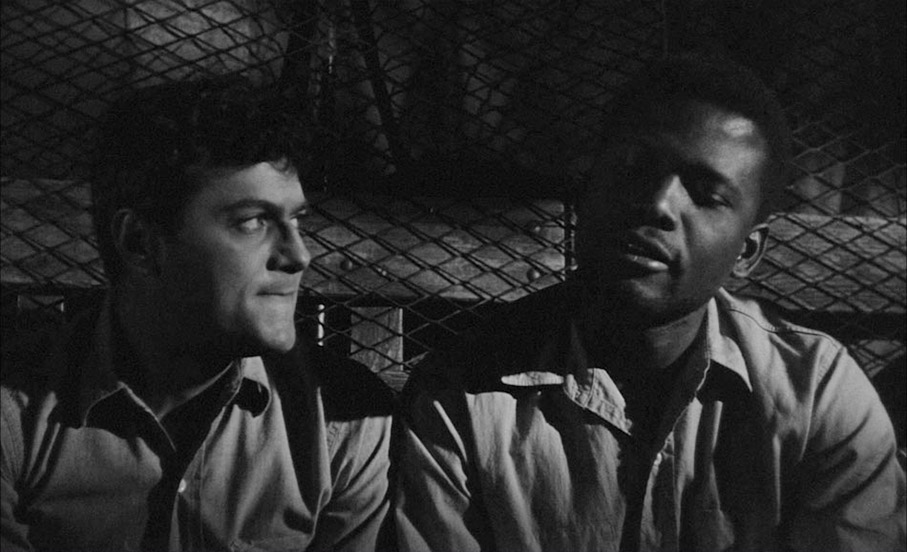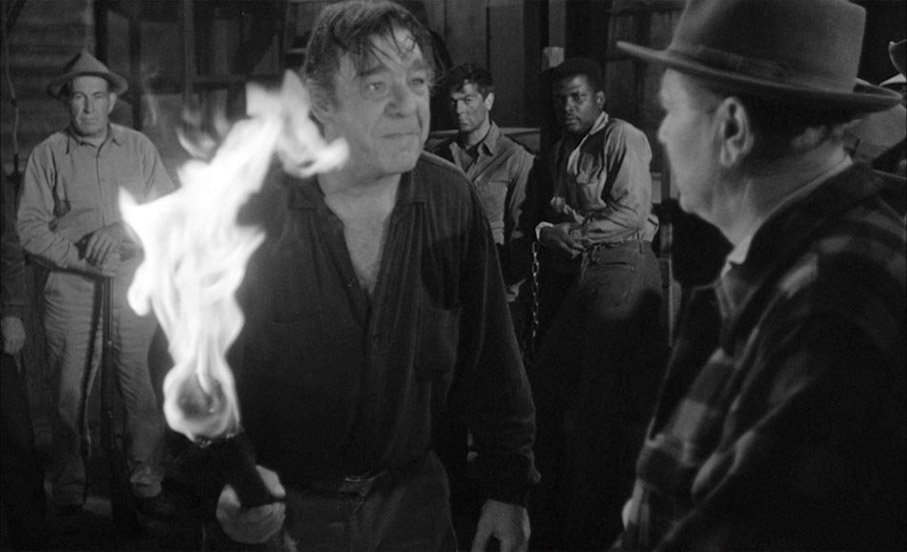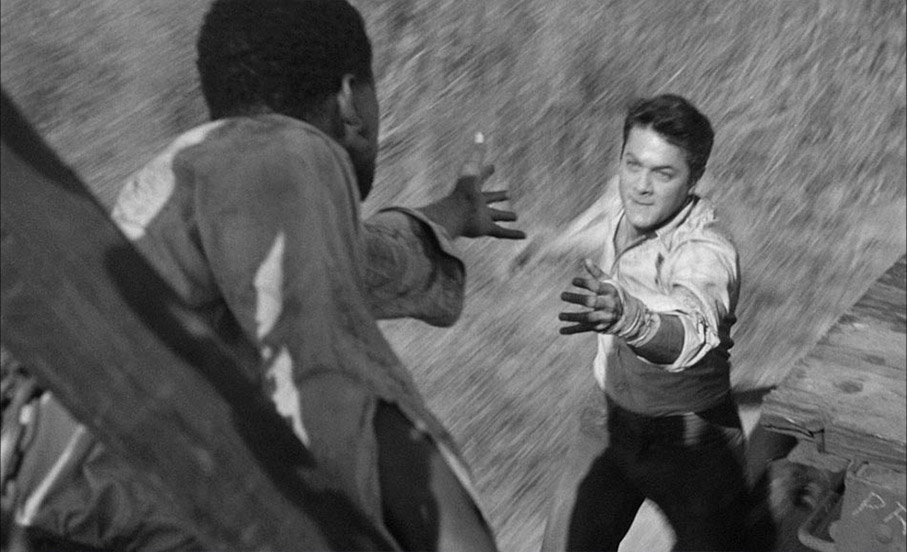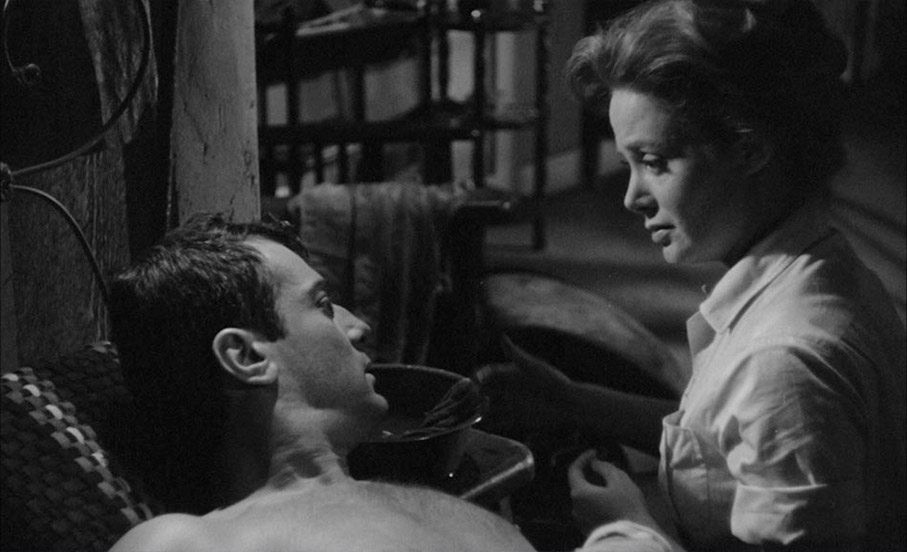| |
"The Defiant Ones thus makes this implicit statement: For America to be truly free, it must overcome its racial prejudice and divides. It's rare for a Kramer film to have an idea, as distinct from a message, but this one is intellectually alive and bristlingly suggestive." |
| |
Dennis Grunes* |
Star Trek, bless its idealistic heart, once presented an anti-racism episode in its no-budget, generally piss-poor third season entitled 'Let This Be Your Last Battlefield'. It featured two characters, Frank Gorshin, he of the Riddler fame in the camp 1960s Batman TV series playing Bele and Lou Antonio, a journeyman and widely used actor who is probably best known from his Star Trek role as Lokai. Each of the warring factions was black and white, Harlequin-style. So no conflict there then. Except that conflict was guaranteed because Bele was black on the right side of his body and Lokai was black on the left side. Well, conflict was inevitable, (ho hum) because if a human being has different colour skin (or even parts of their skin) then we must fear and hate them, right? Shakespeare got it spot on when he said the following, as good an argument against prejudice that exists in all art that I've been exposed to. In The Merchant of Venice, William was suggesting that human was human despite the sub-divisions of ethnicity and tribalism.
"Hath not a Jew hands, organs, dimensions, senses, affections, passions; fed with the same food, hurt with the same weapons, subject to the same diseases, healed by the same means, warmed and cooled by the same winter and summer as a Christian is? If you prick us, do we not bleed?"
Fantastic! That Billy Wobbledagger knew his onions. Well, so did Stanley Kramer. Shackling together two confirmed, dyed in the wool racist convicts who escape after a road accident is a rather high concept idea. One black, one white (and I've edited out my Michael Jackson joke but sort of cunningly put it back in again) and the overriding thing they have in common is a wild hatred for each other. Prisoners are being escorted by truck in the deep south of the US. Chained together (because "...the warden had a sense of humour,") are Noah Cullen and John 'Joker' Jackson, played by Sidney Poitier and Tony Curtis respectively. This pairing needs no subtle sub-textural reading. Both hate each other because of what the colour of their skin represents but both are shackled together. Before they get a chance to pummel each other to death in the back of the truck, bright headlights from another vehicle cause the truck to crash off the road and down a hill. We can forgive the so-so miniature work in these shots and move on to the meat and potatoes. How do hating racists both deal with surviving on the run? Well, at first pretty badly. The terrain is against them. Weather and ground conditions don't help their progress and fights break out between the men every time they have to stop running and start talking.

Now try and imagine Marlon Brando as Joker... Kramer wanted Brando but wanted Poitier more (waiting for his availability, he stalled production). Brando's time window couldn't fall in step with Poitier's, so Kramer had to look further afield for his Caucasian antagonist. You have to remember that in the mid to late fifties, Tony Curtis was a pretty boy, at the height of his fame, a light, comic actor who appeared to coast on his good looks. But he'd never been stretched. Of course, it takes a bucket-load of talent to play even light parts with panache but Curtis was aware that typecasting could scupper a more varied and interesting career. A decade on from The Defiant Ones, he used his charm to devastating effect as serial killer Albert DeSalvo in The Boston Strangler. But in 1958, Curtis was defiantly not the go-to guy for a short-fused, racist petty criminal. In his autobiography, Kramer says that his friends laughed at him considering Curtis akin perhaps to offering 1995 Hugh Grant the role of Travis Bickle in Taxi Driver. "Terribly rude of me to ask, I'm sure, but are you talking to me, or did I get that arse about face?" Kramer was hardly surprised to find Curtis desperate for the chance to flex his talent. I've been a fan of Curtis since Spartacus and especially through his TV series with Roger Moore, The Persuaders. He was the quintessential American and the coolest man on two legs – when I was 12. Of course, Bernard Schwartz, Curtis' birth name, hailed from Czechoslovakian and Hungarian stock so, a son of immigrants, a very typical American then. Kramer even got stick for casting Poitier too. People weren't happy with the black poster boy for decency playing a lowlife criminal. These people need to look up the word 'acting' in any dictionary. Incidentally, 'poster boy' for a cause is a valid phrase and there's no racism intended, I can assure you. I also use the word 'boy' as a phrase of surprise. Just covering my bases. Needless to say, Poitier, to whom Kramer granted some measure of control, was thrilled with Curtis' work and told his director just that. Both characters were incarcerated for solid criminal activity but gain our sympathies due to their predicament and the cinematic trope of always being on the side of those pursued regardless of their crime or guilt.
Two things stood out on a recent viewing, two things of which I still have vague memories from a viewing decades ago. The 'N' word has not lost one iota of its power. Post-Tarantino, you'd think its edges would have been dulled but not at all. It's almost the first spoken word of the movie and it slaps you in the face hard. There is no other word like it. In the context of the 1950s in which it relays maximum disrespect and casual and brutal accusations of a natural inferiority, it's a devastating piece of aural violence. It's a word that presages real violence like no other. And that violence is almost justified. That's how powerful it is. Secondly, you can't act being chained to someone. You have to be chained to someone. In the same way that it is impossible to act brave in a scary situation (you are therefore brave), it's impossible for me to watch both actors and not keep thinking "Jesus, that must really hurt..." God knows both men must have come away with scars soon after the wrap. OK, so they weren't chains (maybe they were) but you clamp anything solid to your wrist for extended periods and you're going to suffer.

The supporting cast are just as scarily convincing as the leads. Kramer stalwart Claude Akins is the leader of a small community, one that defines the term 'mob rule' and is all for stringing up their unwanted guests who are only trying to find tools to release their shackles. Curtis expresses his white privilege with "Don't you understand? You can't go lynching me! I'm a white man!" Poitier's subsequent turn and stare is almost comedy gold if the situation weren't so dire. Curtis flicks his eyes left as if to show his shame at such a self-serving gambit. Akins as Mack is frighteningly and mundanely racist (the worst kind?) but he has a rival, a sympathetic mountain of a man in the form of Big Sam played by Lon Chaney Jnr. Famous for his portrayal of several classic movie monsters, he's a kind soul in a land with a dearth of such folk. That said, the only other sympathetic character is Max, the Sherriff leading the posse played by Theodore Bikel. Seems as if Kramer cast weighty actors to be his points of identifiable humanity. His gentle and good-natured ribbing of almost all those around him makes you believe that this is a job he doesn't exactly enjoy nor take particularly seriously. A constant and somewhat annoying accompaniment to the scenes of the posse is jazz music coming from one of the deputies' radio. He is asked to switch it off the first time we see him (much obliged) but it's on in most of the other scenes. Kim Newman suggests in his Extra that this was Kramer's way of making sure the audience knew this was not some historical film with these horrors being played out using time as an anaesthetic. This was a 'now' problem and 60 years later, racism still seems like a 'now' problem. This diegetic music (and Poitier's singing) is the only music in the film and I think Kramer made a brave and wise choice. An orchestral score might have dulled the drama's sharper edges. Bare, as it were, the movie is more documentary-like, more dynamic and urgent.
The motivations and desires of the next significant character the convicts face cements the bond that has developed between them. A young boy, Billy, waylays them with what appears to be an air rifle. His response to Poitier bending over him making sure he hadn't hurt himself after he hits his head on a rock is classic, learned hatred. He grabs on to Curtis who assures Billy that he won't be hurt. Blink and you'll miss it but there's even Curtis' swift, quiet but moving examination of Billy's head. They return to Billy's house where we find casual racism is alive and well in his mother. The irony is that once the chains are finally off, the men realise that they have both changed and now owe further allegiance to each other beyond the chains. Cara Williams plays Billy's mother, flirting with Curtis big time. Hers is not a sympathetic role but she attacks it with some lustful gusto. As she schemes to get what she wants (as soon as Curtis is well enough), she sets Poitier on his way, deliberately sending him into dangerous territory... To say more would be unfair.

Standing the test of many decades, The Defiant Ones still has resonance. The performances are sincere and the characters perfectly believable and Kramer's direction is assured and unfussy. What's not so believable is that these attitudes still persist today all over the world so maybe we are stuck with the fallen angels of our tribal natures. I don't want to believe that and it's films like this that can nudge us into being more educated. After all, racism is simply a lack of education. So called 'message movies' of social worth may not change lives or attitudes but they can show people how these attitudes exhibit themselves and what we might do to make the world a less hateful place. Nice one Stanley.
The 1.66:1 frame boasts a clean transfer. I am aware that a judgement of the contrast is somewhat based on the way one's TV or monitor is set up but I did feel that if the contrast was set on 7/10, I may have preferred 8/10 but hey, personal preference should not colour a disc's technical worth. In all other respects, The Defiant Ones has scrubbed up really well.
The clarity of the LPCM mono sound is first rate and there are subtitles for the deaf and hard of hearing.
The original artwork on the cover is used as the home screen and I can't help smiling at the ridiculous exaggeration of Tony Curtis' somewhat slender frame.
Trailer (2' 24")
"Chained Fury! Chained to each other like animals! At each other's throats like animals!" But those words, presented on screen are the only nod to the style of the era. Otherwise this is a strikingly modern piece (made 60 years ago!) There's no music (as in the film itself) and the shots and scenes are well chosen and the slices of narrative enough to give you a real sense of what the film is about. I was surprised by how effective it was. It's a bit grubby but then who restores trailers? It's a nice addition to the disc.

Kim Newman on 'The Defiant Ones' (19' 59")
The redoubtable Newman toes the oft-quoted critical Kramer line in that he acknowledges the producer/director's sincerity and importance but is highly critical of some of his work (I disagree about Guess Who's Coming To Dinner but hey). He may be responding to The Defiant Ones from a distant and usually steel-trap of a memory (he mentions the convicts are shackled together "by the ankles..." and later "by the legs..." uh, no. Wrists, actually). There's no denying this man's extraordinary grasp of cinema. It's practically one shot with a few intercut posters and clips. I suspect it may be just the one shot of Newman with very few retakes. If I'd edited this, I would certainly have edited the two gaffes out. But he gives us great info on both actors and makes a nod at the subtext of the film (no, not the racism but the unmentioned eroticism of two men always waking up almost cuddled together). He makes a great point that the pared down nature of this drama added to its effect because it didn't suffer from what Newman calls 'bloat' found in Kramer's bigger budget efforts. It's a fair point.
This was Poitier's first 'above the title' starring role (something Curtis insisted upon which makes me like him even more) and both he and Curtis grab their characters by the scruffs of their necks. Acting styles have changed in 60 years but the deepening relationship between the two is handled with considerable skill. It's a tough ask to show two realistic character arcs in 96 minutes but in The Defiant Ones, this works gangbusters. For Kramer fans and those into social issues and how good cinema can raise awareness, this disc comes well recommended.
|